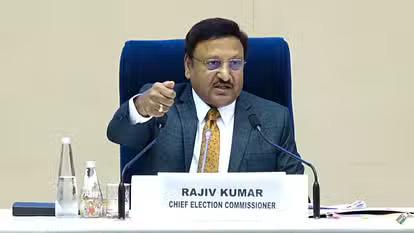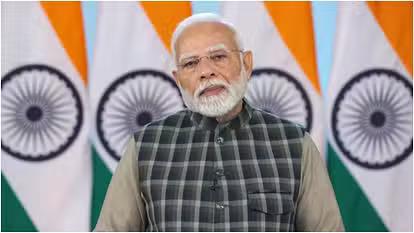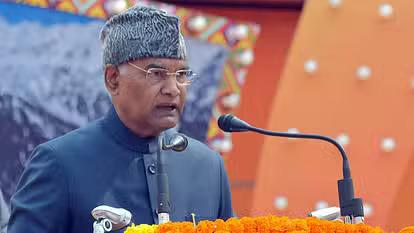Reg No. - CHHBIL/2010/41479ISSN - 2582-919X
One Nation One Election: After the Kovind report, now the bill has been approved, understand how ‘one country one election’ will be implemented

One Nation One Election: The Union Cabinet has approved the ‘One Nation, One Election’ bill. Earlier in September, the Kovind Committee report was approved which said that the recommendations of simultaneous elections will be implemented in two phases. Lok Sabha and assembly elections will be held in the first phase and local body elections in the second phase.
The Union Cabinet on Thursday December 12 , 2024 approved the ‘One Country, One Election’ bill. Sources said that a comprehensive bill is expected after this decision. Earlier in September, the Union Cabinet had approved the report of the Kovind Committee on ‘One Country, One Election’.
Prime Minister Narendra Modi first put forward his idea of one country one election on the occasion of 73rd Independence Day on August 15, 2019. He had said that the process of integration of the country should always continue. The Prime Minister had also put forward his idea on the occasion of Independence Day on August 15, in 2024.
What is the proposal of one country one election?
When was this issue raised for the first time? Have simultaneous elections ever been held in the country before? What is the stand of the Election Commission on this? What has happened now on simultaneous elections? What are the recommendations of the Kovind Committee?
Let us know…
What is ‘One Country One Election’?
The objective of this proposal is to hold simultaneous elections for the Lok Sabha and Legislative Assemblies across the country. At present, elections for the Lok Sabha and Legislative Assemblies are held separately, either after the completion of a five-year term or when the government is dissolved for some reason. This has been arranged in the Indian Constitution. The term of the Legislative Assembly of different states ends at different times, according to which assembly elections are held in that state. However, there are some states where assembly and Lok Sabha elections are held simultaneously. These include states like Arunachal Pradesh, Andhra Pradesh, Odisha and Sikkim. At the same time, elections in states like Rajasthan, Madhya Pradesh, Telangana, Chhattisgarh and Mizoram were held just before the Lok Sabha elections, while elections were held in Haryana, Jammu and Kashmir, Maharashtra and Jharkhand within six months of the end of the Lok Sabha elections.
Prime Minister Narendra Modi has long been a supporter of one country one election. The Prime Minister raised the issue of one country one election on Independence Day 2019. Since then, one country one election has been talked about by the BJP on many occasions.
What is the reason for the debate on one country one election?
In fact, the debate on one country one election started in 2018 after a draft report of the Law Commission. Economic reasons were enumerated in that report. The commission said that the expenditure of the Lok Sabha elections in 2014 and the assembly elections held after that was almost the same. At the same time, if the elections are held simultaneously, this expenditure will be divided in the ratio of 50:50.
In its draft report submitted to the government, the Law Commission had said that the process of conducting simultaneous elections was disrupted after the year 1967. The commission said that in the early years of independence, there was a single party rule in the country and regional parties were weak. Gradually other parties became stronger and came to power in many states. At the same time, the use of Section 356 of the Constitution also disrupted the process of conducting simultaneous elections. Now there has been a change in the politics of the country. The number of regional parties has increased significantly in many states. At the same time, they also have government in many states.
When were simultaneous elections held for the first time?
After independence, elections were held in the country for the first time in 1951-52. Then along with the Lok Sabha, elections for the Legislative Assemblies of all the states were also held. After this, elections were held simultaneously for the Lok Sabha and the State Assemblies in 1957, 1962 and 1967. This sequence was broken after 1968-69, as some assemblies were dissolved due to various reasons.
In a webinar organized on one nation-one election, former Supreme Court judge Justice AK Sikri had said, ‘One nation-one election is not a new concept. The first four general elections of independent India were held like this. Justice Sikri says, ‘The change in the one nation, one election process started from 1960 when non-Congress parties started forming governments at the state level. This included UP, Bengal, Punjab, Haryana. After this, mid-term elections were held after the split of Congress in 1969 and the 1971 war and after this the dates of assembly elections never matched with the general elections and separate elections started.’
In the same webinar, senior Supreme Court advocate and former Additional Solicitor General Parag P. Tripathi had said, ‘Elections are related to democracy and democracy is a means of governance. The concept of one nation-one election lasted from 1952 to 1967. The sovereignty and identity of the states were strengthened by separate elections. This is a better option for the semi and cooperative federalism of the country.’
How will this proposal be passed?
Former Secretary General of Rajya Sabha Desh Deepak Sharma told about this in an interview, ‘A process will have to be done regarding one nation-one election which also includes constitutional amendment and approval of the states. This bill will have to be passed in the Parliament first. One obstacle is said to be that before implementing it, the assemblies will have to be dissolved. However, this is not so. When the Rajya Sabha was formed and many members came in it, the question arose as to how to retire them by one-third each. It is not necessary that their tenure be reduced, it can also happen that the states whose term has not been completed may be given additional time.’
Now the question arises that how will the state assemblies be dissolved? There are two answers to this – first, the Center should impose Article 356 in the state through the President. Second is that the governments of the concerned states themselves ask to do so.

What is the stand of the Election Commission?
The Election Commission has said several times that it can hold Lok Sabha and assembly elections simultaneously. According to Chief Election Commissioner (CEC) Rajiv Kumar, the subject of holding parliamentary and state assembly elections at the same time does not fall under the purview of the Election Commission. He said that it definitely involves a lot of logistics, a lot of disruptions, but this is something that the legislatures have to decide. He had said that certainly if this is done, we have told our position to the government that administratively the Commission can handle it.

PM Modi – Photo : X/@BJP4India
What has happened on simultaneous elections now?
The Union Cabinet approved the ‘One Nation, One Election’ Bill on December 12 ,2024 . Sources told ANI that a comprehensive bill is expected after this decision, which will pave the way for simultaneous elections across the country.
On September 18, 2023 the Union Cabinet approved the report of the Kovind Committee on ‘One Country, One Election’. In fact, a high-level committee on simultaneous elections was constituted on 2 September 2023 under the chairmanship of former President Ram Nath Kovind. The committee submitted its 18,626-page report to President Draupadi Murmu earlier this year.
According to the government, the report was prepared after extensive consultations with stakeholders, experts and 191 days of research work since the formation of the committee. Former President Kovind said that the central government should build a consensus on the ‘One Nation, One Election’ initiative. This issue is not in the interest of any party but in the interest of the nation. One Nation, One Election will be a game-changer, this is not my opinion but the opinion of economists, who believe that after its implementation, the country’s GDP will increase by 1-1.5 percent.

Former President Ram Nath Kovind – Photo: ANI (File)
What are the recommendations of the Kovind Committee?
The committee has said in its report that the recommendations of simultaneous elections will be implemented in two phases. In the first phase, Lok Sabha and assembly elections will be held simultaneously. In the second phase, local body elections (panchayat and municipality) will be held within 100 days of the general elections. Under this, a common voter list will be prepared for all elections. For this, detailed discussions will be started across the country. At the same time, an implementation group will also be formed.
The Kovind Committee also said
Simultaneous elections have been held between 1951 and 1967.
The 170th report of the Law Commission in 1999 suggested elections for one Lok Sabha and all assemblies in five years.
The 79th report of the Parliamentary Committee in 2015 suggested ways to conduct simultaneous elections in two phases.
The high-level committee headed by Ram Nath Kovind held extensive consultations with various stakeholders, including political parties and experts.
The report is available online: https://onoe.gov.in
Extensive feedback has shown that there is widespread support for holding simultaneous elections in the country.
How will One Country One Election be implemented?
Earlier, officials had told PTI that at least five amendments would have to be made in the Constitution to hold simultaneous elections. These include Article 83 related to the term of the Houses of Parliament, Article 85 related to the dissolution of the Lok Sabha by the President, Article 172 related to the term of state legislatures, Article 174 related to the dissolution of state legislatures and Article 356 related to the imposition of President’s rule in the states. Along with this, the consent of all parties will be necessary keeping in mind the federal feature of the Constitution. At the same time, it is also mandatory that the consent of all state governments is obtained.
What do the government and the opposition say?
One Country One Election has been part of the BJP’s electoral agenda. The BJP-led NDA will introduce this bill during its current tenure at the Center. The Kovind Committee report came just after the completion of the first 100 days of Prime Minister Narendra Modi’s third consecutive term. During his speech from the Red Fort on Independence Day this year, the Prime Minister had requested everyone to unite for a law to conduct simultaneous elections. Earlier, Union Parliamentary Affairs Minister Prahlad Joshi said that Parliament is mature and there will be discussion, there is no need to panic. India is called the mother of democracy, development has taken place.
At the same time, the opposition Congress has strongly opposed the proposal of ‘one nation, one election’. Congress President Mallikarjun Kharge has said that ‘one nation, one election’ cannot work in democracy and the Congress is not with it. Kharge argues that if we want our democracy to survive, we need to hold elections whenever required.
YOU MAY LIKE THIS










